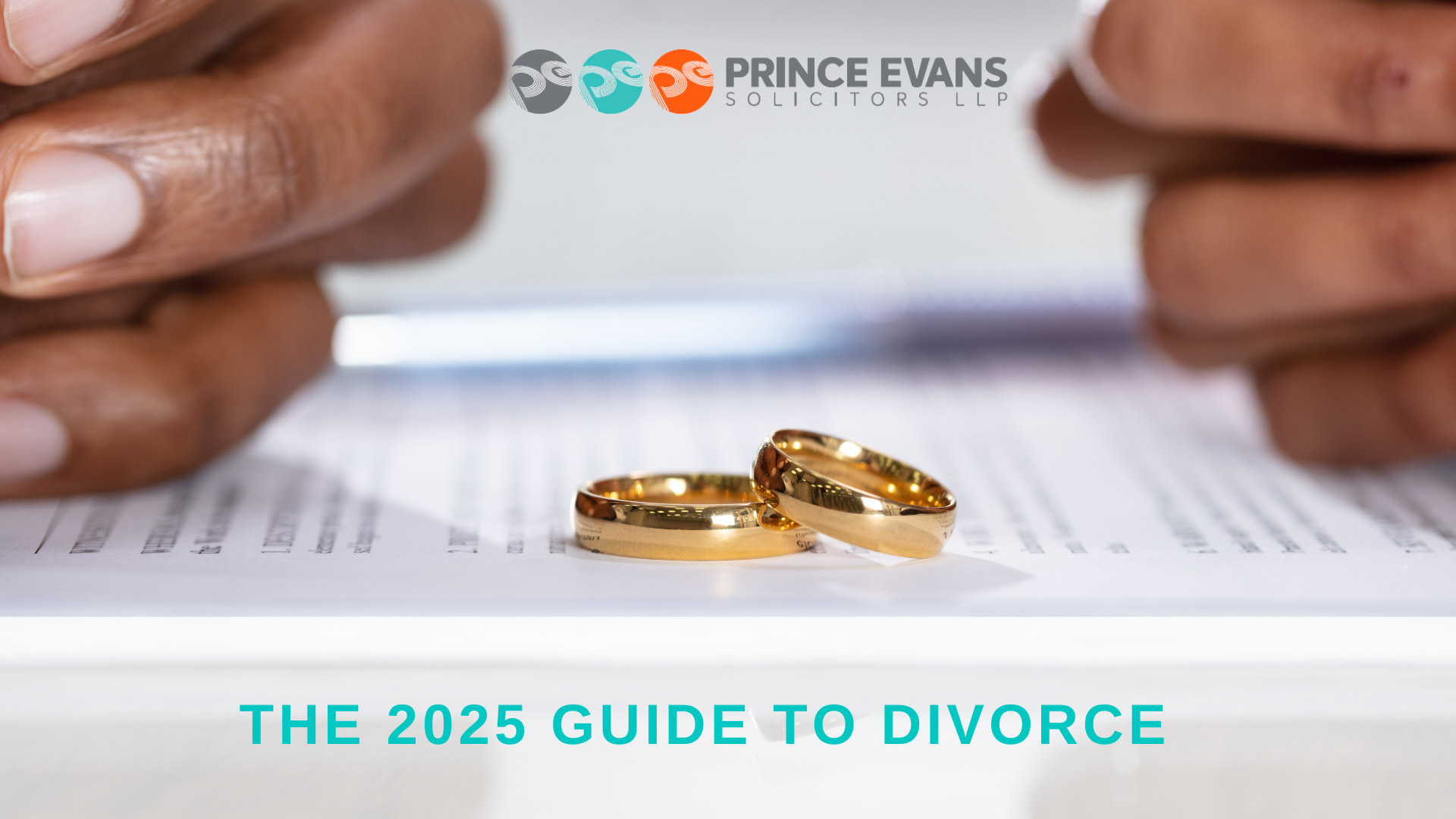The 2025 Guide to Divorce
Divorce can be an emotionally challenging and stressful time for everyone involved and the amount of information flying around can feel overwhelming and confusing. Making sure you understand exactly what to expect and what you need to do is vital.
At Prince Evans we like to keep things simple and straightforward and specialise in minimising the emotional distress of divorce on clients and their families by providing expert help and advice. When a marriage breaks down there are bound to be questions you need the answers to. This 2025 guide will help you move forward with confidence and clarity.
No-fault divorce – ‘blame games’ ends
Landmark reforms to divorce law in 2022 introduced the current no-fault divorce system, making divorce simpler and less blame driven process. It ends completely the need for separating couples to apportion blame for the breakdown of their marriage. Instead enabling couples to focus on key practical decisions involving children or their finances.
The changes mean that a spouse or a couple can jointly, apply for divorce by stating their marriage has broken down irretrievably. It eliminates the unnecessary finger pointing and acrimony at a time where emotions are already running high.
In 2025, divorce is more streamlined, and prevents one partner from vindictively contesting and blocking a divorce, offering protection where there are power imbalances or abuse in a marriage.
One year rule
You must have been married for at least one year to obtain a divorce, so if you have only been married for a short time, unfortunately, it will not be possible to get a divorce straight away and there are no exceptions to this rule.
Quickie Divorce
Regardless of your individual circumstances and background a ‘Quickie Divorce’ is in deed a myth.
The no fault divorce timeline will typically take a minimum of six months and includes 20 weeks from the point of filing the divorce application to the conditional order and further six weeks and one day between the conditional order and final order. The mandatory 20 weeks ‘cooling off’ period is designed to give couple time to reflect on the divorce process, ensure it is in their best interests and pursue reconciliation if possible and further enables couples to start making practical arrangements for children and finances.
Talking things through early and getting legal advice can help keep the process on track and avoid unnecessary delays.
Financial Arrangements
It is important to note that the divorce finances are dealt with separately to the divorce, therefore a final divorce order does not sever your financial ties. In England and Wales this means that whilst you may be legally divorced and have a final order for divorce, unless there has been an additional financial order severing your financial ties to one another, you and your ex-spouse still have the ability to make financial claims in the future.
To prevent financial claims being pursued later, even after your divorce has been finalised, is by having a financial order in addition to your final order in the divorce process.
Agreements in relation to financial matters can be reached in a variety of ways, either through direct discussions with your spouse, or via alternative dispute resolution methods such as mediation or by obtaining an order within court proceedings. Contested court proceeding should however only be considered as a last resort or in certain complex or emergency situations.
If you have reached an agreement regarding your finances, this can be formalised into a financial consent order and sent to the court for approval, which makes the agreement legally binding. These orders ordinarily set out how you wish to divide and distribute your assets, which might include pensions, property, savings and investments. It can also deal with financial support, often referred to as maintenance.
When considering what financial agreements need to be made, it is important to consider whether a clean break is appropriate. A clean break will sever financial ties and prevent any financial claims being pursued in the future.
Even where you and your spouse have little or no assets, a clean break consent order is advisable to ensure that financial claims and ties are extinguished appropriately alongside your divorce.
Irrespective of how simple or complex your financial situation is, it is always better to act with caution and seek legal advice at an early stage.
Child Arrangements
If you are going through a divorce or separation, making the right arrangements for your children is likely to be a major concern. The welfare of the children is the family court’s primary concern and the law encourages parents to work together to agree on living and contact arrangements without court involvement.
If parents cannot reach an agreement, they can apply for a Child Arrangements Order to determine where the children will live and how they will spend time with each parent. Before an application is made it is important to try and agree arrangements with the other parent. Mediation can also assist parties in trying to reach an agreement, however if it is not possible to agree, then an application for a Child Arrangements Order can be made. In most cases, before an application is made to the court parties are required to attend a Mediation Information Assessment Meeting (MIAM) to establish whether the parties might be able to reach an agreement, rather than going to court.
Another important factor to consider is child maintenance. Child maintenance is an arrangement between separated parents of a child, for payments to cover a child’s living costs when one of the child’s parents does not live with them. Payments can be agreed privately or calculated through the Child Maintenance Service (CMS).
Whilst statistics show that the change in divorce law and procedure is encouraging couples to start the process without obtaining legal advice first, this can be detrimental to any financial arrangements that might need to be made. It may be tempting for couples to try and save costs by applying for a divorce online without input from a solicitors given the precarious economic situation and increasing costs of living, however we must emphasise the importance of seeking early legal advice.
At Prince Evans we believe taking legal advice as early as possible helps to reduce and manage conflict and enable couples to make informed decisions about their future.
If you are considering a divorce in 2025, or simply want to understand the process better, the Family and Matrimonial Team at Prince Evans will be offering complimentary consultations to enquirers seeking guidance on divorce and finances. We hope that you will leave the consultation feeling more confident and informed about the options available to you. Please contact the Family and Matrimonial Team to arrange your appointment.

Written by Partner & Head of Family Muna Saleem .

